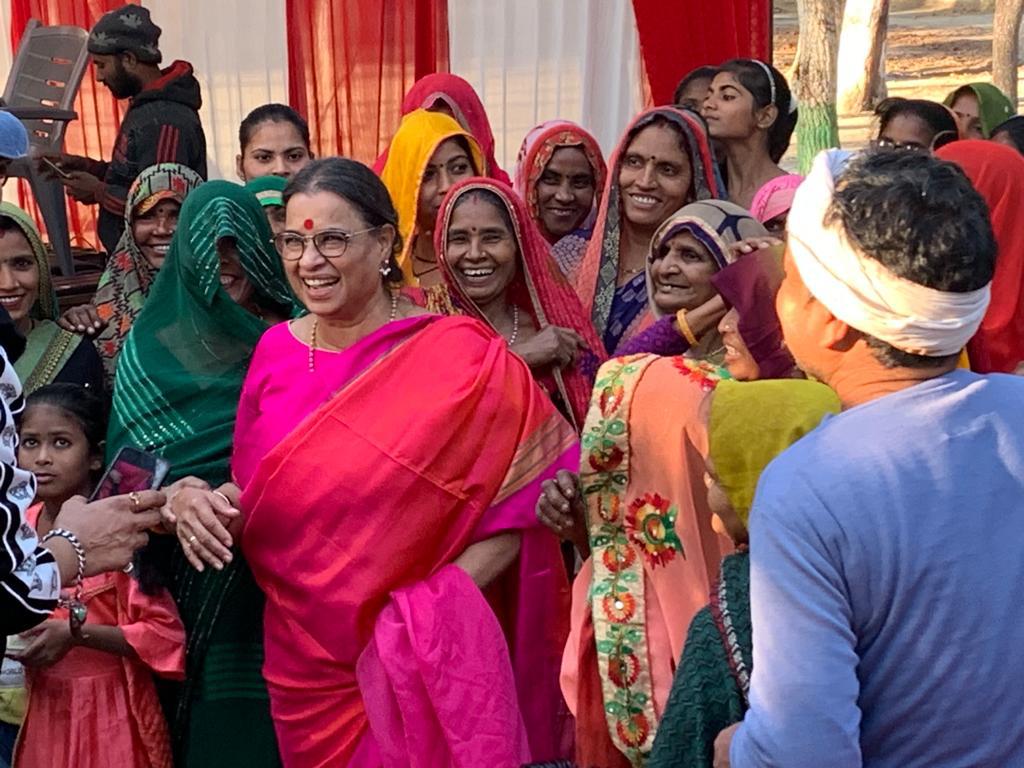The brave women of Lohia Khurd: stories of hope, resilience and sustainable living.
The story of the women of Lohia Khurd, Etawah district in Uttar Pradesh shows us how grassroots initiatives are important for sustainable development and women’s empowerment. The journey in this story is long and interesting, filled with hard work, determination, and self-reliance. Women of Lohia Khurd has made us understand how important it is to organize and motivate women to involve in different micro-economic initiatives, to empower them, to help them to reclaim their deserved spaces in their community, and to create a society of equity with clean resources and power. Educating women, making them financially independent, providing them with credits, and clear land titles, and including them in decision-making can help us to understand the important inter-relationship which exists between Gender, economic development, and Sustainability.
Beginning of a journey In 1987, the Centre for Social Research started a development project in Etawah district which is located in the central region of Uttar Pradesh. Three blocks covering twenty-four villages were under the program. The project – “A step towards self-reliance: Etawah “was designed to integrate women into the development initiatives through awareness and mobilization. The main areas which were covered under the program were women’s health, education, childcare, and employment. It recognized the triple roles of production, reproduction, and community work played by women with equal sensitivity. The project was supported by the Interchurch Cooperation Organization (ICCO).
Parivartan, the social research, and action unit of CSR have been actively engaging with the various programs and initiatives in Etawah. The program covers four backward villages – Ayara Lohia, Bahadurpur Lohia, Basagawanjafarabad, and Badripooth. The initial meetings and discussions conducted by CSR received enthusiastic support from people of all ages, caste groups, and socio-economic statuses. The discussions led to the planning of several projects in several phases.
First, a socio-economic profile was created of the villages, then Units of Parivartan with full-time volunteers organized community discussions about the various problems and issues faced by the village. Voluntary associations of Ayaralohia and nearby villages started a school for primary schooling of boys and girls under the guidance of CSR, and different skill development and training centers were created, along with various self-employment projects for women. A wasteland development committee was set up with an aim of planting trees and recovering the existing natural resources and green areas. A women’s collective was established for income-generating activities through horticulture, animal husbandry, and cultivation of medicinal plants and papaya plantations.
A Parivartan Pathashalla at Ayala Lohia village functions as a prime education center. Under the drudgery–reducing schemes, CSR proposes to install units for the procession of cereal and pulses under the supervision of women’s collective and 12 hand-pump wells in various hamlets of these villages. The income-generating activities here include goat–rearing, piggery, rope-making, and handloom weaving. For health and sanitation, Parivartan built community latrines, maternity wards.
Women’s organizations such as Parivartan Mahila Swawalamban Samiti (Women’s Collective for Self–Reliance) was created with the objective of organizing and mobilizing rural women. The samiti organizes monthly village–level meetings with rural women. Local issues and problems are addressed in these meetings, including issues of health, employment; legal rights of women and the social role status of women are discussed. Different actions were planned to meet various issues such as agricultural wages and credit for rural women and problems of availability of drinking water and promoting awareness among the women about themselves and the role of women in development. In all of these initiatives, the prime importance was given to the organization of women. Empowering women to come out of their domestic chores and household to be active participants in their respective communities. Be part of decision-making and make decisions about their own bodies and life. In doing so CSR through extensive surveys and research understood how important and essential it is to make women economically independent, and to have control over their own finances and this financial freedom exposes women to the world of opportunities and ideas. Winds of change: the changed life of the women of Lohia Khurd
The initiative which was implemented by the Centre for Social Research began to bring drastic social and economic changes to the lives of the citizens of Lohia Khurd. Women especially were on the frontline of change and development, taking up new initiatives and taking part in the decision-making process in their respective communities. With excess income and decision-making capacities, women began to sustainably manage their households and they implemented various practices which began to protect their natural environment, they took active participation in tree plantation and sustainable management of animals.
The director of the Centre for social research, Dr. Ranjana Kumari, recently visited Lohia Khurd to interact with the women; her contribution to the development of Lohia village is crucial and exceptional as she began her Social work from Lohia village. As part of her yearly visit and interaction with the community, Dr. Ranjana explains her first-hand experiences of the drastic changes which she observed in the village. She observed crucial changes in the lives of women and the community as a whole. She explains how important it is for grassroots communities to be associated with development plans and how drastic development can be brought to societies by incorporating sustainable ways of living and income generation. By incorporating women more into decision-making and community planning, societies can be developed and prosper.
She mentions how the education of girls is an important way through which societies can be developed. Making young women excess to proper education has proven to bring exceptional changes to their villages, making young women active participants in social decision-making processes, which have made way for accessing opportunities for women in the economic and political sectors of our societies. Educated women have also worked towards, implementing sustainable development goals of the United Nations, such as working towards gender equality, resource conservation, and forest conservation. One of the most important lessons which have been learned by observing the process of changes in the Lohia village is that women have to be made active participants in implementing and fulfilling the sustainable development goals (SDGs). Women are crucial members of our society; they can take on multiple responsibilities, such as domestic and non-domestic work, such as taking up jobs in the formal and informal sectors of the economy. Most women take up the responsibilities of taking care of their families, caring for their children, and doing a larger part of the household work. In doing so women are mostly affected by the current rate of climatic changes and resource depletion. The burden of climate change is increasing on women, especially at grassroots levels where women have to walk hundreds of kilometers to collect resources for providing their families with proper food and other nutrition. Therefore women have realized that conserving nature and implanting a sustainable way of life is a way through which they can decrease their domestic workload and go out and generate income on their own, be self-reliant, making them financially more active and independent.
In Lohia Khurd, women now are active participants in village resource management. Young girls are sent to schools for education and even sent outside of their villages to get access to higher education. Women are engaged in different economic activities such as animal husbandry, tree plantation, and resource management of their communities; this has led to proper resource utilization and proper waste management. This has also resulted in the greenery of the area which was an arid dry land with no proper vegetation and plantation. With the increasing financial independence, violence against women has also lessened, making them more confident to address any act of violence against them. The current and the next generation women have excess to proper education and financial security, setting an example of how important is it important for the government and civil society to work at the grassroots level to develop a nation and make a nation self-reliant. A nation cannot attain its sustainable goals without incorporating grassroots communities. Through decentralization of its policies and plans, the government will be able to create a sustainable society, where gender equity, environmental justice, and fundamental rights are accessible to all.




